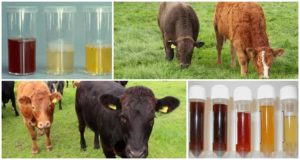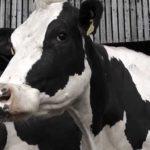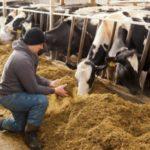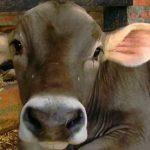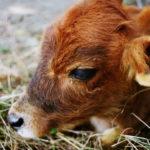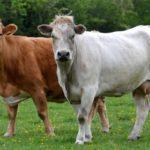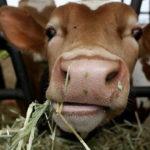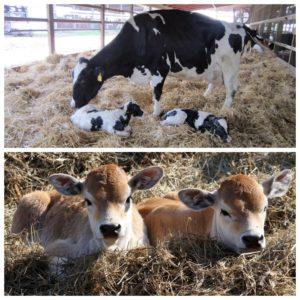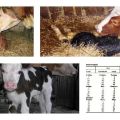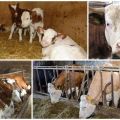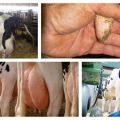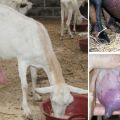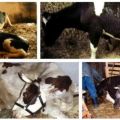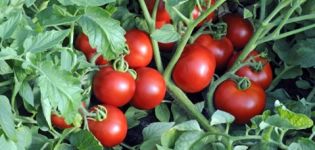What to do if the cow is full of crushed at home
In backyards where cows and other animals are kept, there are situations when cows eat feed intended for other cattle, crushed grain, mixed feed from storage sites, and not thrown away waste. What to do if the cow has overeat crushed or other carbohydrate feed that can quickly ferment in the stomach and harm the animal's condition? Let us analyze what the danger is, what are the symptoms, treatment and prevention of this condition.
Why overeating is dangerous
As a result of overeating high-carb feed, cows develop a number of conditions. In case of non-acceptance of therapeutic measures, they can quickly replace each other in order of aggravation of symptoms up to a threat to the life of the animal. The development of a series of painful conditions is associated with changes in the cow's stomach, namely in its main section - the rumen.
As a result of overeating wheat, barley and corn, the condition of the cow is mild to moderate, since these cereals are easily digestible, oats are heavier, its grain is more difficult to digest. After crushed grain, the disease develops faster than after whole grain, and leads to more fatal results. The danger of consuming compound feed is that its components can cause increased fermentation in the rumen. Overeating of alfalfa, cabbage, beets leads to the same consequences.
The initial pathological condition is scar swelling - tympania. Further fermentation of the compressed feed in it leads to the accumulation of fluid - acidosis, a subsequent sharp decrease in the acidity of the contents of the rumen and the change of beneficial microflora to pathological. The next stage, when pathogens release toxins into the blood, is characterized by inhibition of cardiac activity, kidney function and is a very alarming condition that leads to the death of the animal.
If the animal manages to overcome the state of severe poisoning of the body as a result of overeating, there may be long-term consequences in the form of fungal lesions of the rumen, hepatic abscesses for several months, which significantly reduces the life span of the animal. If a pregnant cow is overeating, she can abort after 10-14 days.
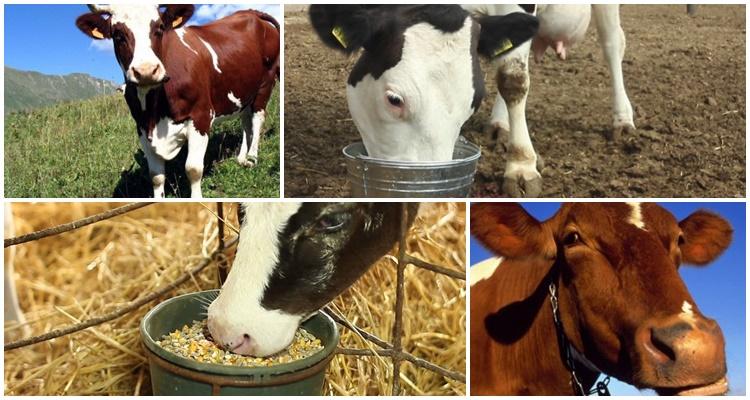
Factors provoking indigestion
An abrupt transition from one type of feed to another, an excess of the volume of grain feed in the daily diet can provoke inflammation of the rumen. In cows, after the dry period, the rumen shrinks, and a sharp increase in the amount of feed at the onset of maturity can also lead to acidosis. It is important to avoid a reduction in scar volume.
The amount of compound feed in the diet is reduced by 2-3 months and high-quality roughage is left.
Other factors of malfunctioning of the stomach are feeding with low-quality feed, the predominance of frozen or decaying products in the feed - apples, potatoes, carrots, cabbage. For the normal condition of cows, it can be dangerous from 10 to 15-20 kg of grain or compound feed mass. In this case, the microbial population in the rumen completely changes in 2-6 hours.
Signs and symptoms of overeating
Initially, cows belch from excess gas accumulation and tympania, animals drink a lot. As fluid accumulates, belching disappears, thirst is replaced by a complete rejection of water, a sharp increase in dehydration and anuria.
Other signs of overeating include:
- refusal to feed, lack of chewing gum;
- diarrhea - masses of manure offensive, yellow in color, with undigested particles;
- bloating, rumbling in the rumen or lack of movement in it (hypo- and atony);
- salivation increases;
- dryness of the upper lip and nose;
- an increase in the frequency of breathing and heartbeat;
- increased body temperature (rare);
- depressed or aggressive state.
If the animal does not get up for 24-48 hours - this is an alarming sign, you must immediately call the veterinarian!
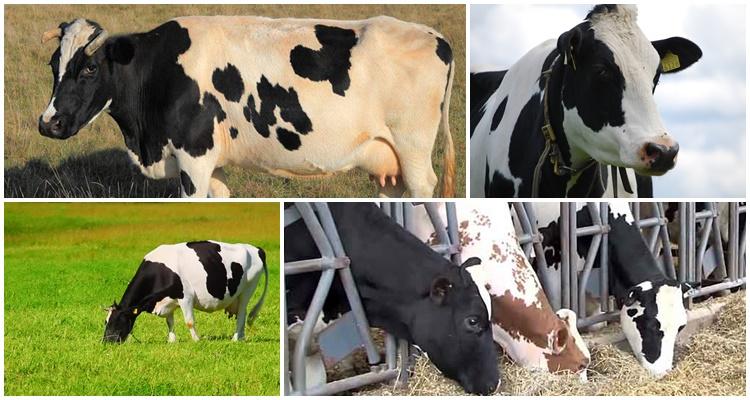
With a loss of 10-12 percent of fluid from body weight, the prognosis for the life of the animal is unfavorable.
What do we have to do?
If it is noticed that the animal has eaten food that was not intended for it, fed uncontrollably, then it should be forced to move as much as possible, drink warm water or with chamomile infusion. In case of swelling and lack of movement in the scar, massage the left side of the belly counterclockwise.
Irrigation of the scar may be needed. The animal is first given a large amount of water. The procedure is carried out using a hose 2.5-3 meters long and 3-4 centimeters in diameter, the tip is lubricated with fat or oil. The hose is not quickly directed into the rumen, the free end is lowered below the level of the animal's stomach. They are waiting for the contents of the scar to gradually leave. With a severe degree of the disease, drug treatment is necessary:
- droppers with sodium chloride;
- glucose injections;
- vitamin B injections1 (thiamine) - 2-5 milliliters 2-3 times a day;
- after a few days of illness, antibiotics "Macerobacillin", "Tetracycline" (100 g twice a day for an adult animal) are needed.
- ruminators and emetics ("Tympanol").
Diarrhea in an animal is a positive sign. It indicates that the animal's body is actively getting rid of toxins, and after 3-4 days there is usually a return to normal nutrition. Worse, if the animal grows anuria, refusal of water, there is no bowel movement. Here you cannot do without setting droppers.
Preventive measures and feeding requirements
In order to prevent digestive disorders in cows, it is important to do the following:
- strictly observe feeding norms;
- use high quality feed;
- when switching to other types of feed, observe the principle of gradualness and at the same time give roughage in the form of hay to stimulate the stomach;
- add minerals to the feed - salt, chalk;
- use vitamin vegetables in the diet - carrots, pumpkin, fodder beets.
Careful attention to the wards, strict feeding discipline will help to maintain the productivity and health of the animals.
